人教版初中英语中考总复习知识点系列
中考英语中考英语总复习数词-知识点归纳与练习
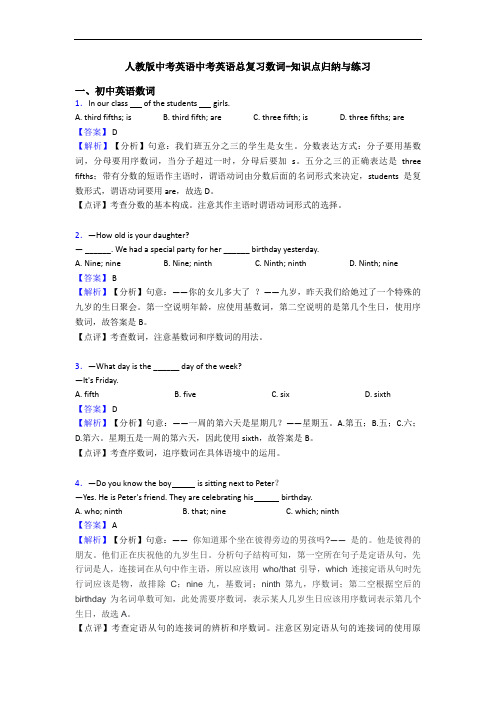
人教版中考英语中考英语总复习数词-知识点归纳与练习一、初中英语数词1.In our class of the students girls.A. third fifths; isB. third fifth; areC. three fifth; isD. three fifths; are【答案】 D【解析】【分析】句意:我们班五分之三的学生是女生。
分数表达方式:分子要用基数词,分母要用序数词,当分子超过一时,分母后要加s。
五分之三的正确表达是three fifths;带有分数的短语作主语时,谓语动词由分数后面的名词形式来决定,students是复数形式,谓语动词要用are,故选D。
【点评】考查分数的基本构成。
注意其作主语时谓语动词形式的选择。
2.—How old is your daughter?— ______. We had a special party for her ______ birthday yesterday.A. Nine; nineB. Nine; ninthC. Ninth; ninthD. Ninth; nine【答案】 B【解析】【分析】句意:——你的女儿多大了?——九岁,昨天我们给她过了一个特殊的九岁的生日聚会。
第一空说明年龄,应使用基数词,第二空说明的是第几个生日,使用序数词,故答案是B。
【点评】考查数词,注意基数词和序数词的用法。
3.—What day is the ______ day of the week?—It's Friday.A. fifthB. fiveC. sixD. sixth【答案】 D【解析】【分析】句意:——一周的第六天是星期几?——星期五。
A.第五;B.五;C.六;D.第六。
星期五是一周的第六天,因此使用sixth,故答案是B。
【点评】考查序数词,追序数词在具体语境中的运用。
4.—Do you know the boy is sitting next to Peter?—Yes. He is Peter's friend. They are celebrating his birthday.A. who; ninthB. that; nineC. which; ninth【答案】 A【解析】【分析】句意:——你知道那个坐在彼得旁边的男孩吗?——是的。
【中考英语复习之课本知识归纳(人教版)】课时05

课时05.七年级下册Units 7~9【答案】一.重点单词1.weather 2.cook 3.park 4.message 5.could6.back7.problem8.again9.summer 10.juice11.soon12.vacation13.hard14.mountain15.winter16.hotel17.restaurant 18.bank19.hospital20.street21.near22.across23.behind24.town25.around 26.along27.turn28.crossing29.climb30.road31.often32.air33.money34.straight 35.tonight36.ter40.handsome41.round42.each 43.way44.another45.end二.词形百变1.raining rainy 2.windy 3.cloudy 4.sunny5.snowy 6.cook cooker7.worse worst8.drier driest wet drier9.colder coldest warm warmer warmest warmth10.hotter hottest11.visitor12.Canadian13.sat sitting14.harder hardest difficult15.European16.countries17.skated skating18.Russian19.paid20.northern21.left22.crossing23.spent24.monkeys25.enjoyable enjoyment26.easily easier easiest27.taller tallest short28.higher highest height29.thinner thinnest30.heavier heaviest heavily31.less least32.personal33.put putting34.described description35.differently difference三.核心短语1.take a message 2.call (sb.) back3.on (a) vacation 4.across from 5.in front of6.go along (the street) 7.turn right/left 8.spend time9.enjoy reading 10.(be) of medium height/build11.a little 12.in the end 13.look like 14.far from... 四.核心句型1.weather cloudy 2.Terrible 3.in front of4.go along turn left 5.look like高频考点突破考点1How's the weather in Shanghai?上海天气怎么样?考点2—Could you just tell him to call me back?—Sure, no problem.——你能告诉他给我回个电话吗?——当然,没问题。
英语人教版九年级全册中考专项复习

年中考英语专习专题一Grammar Revision 名词(Nouns)考点解读:中考对于名词的考查主要侧重以下几点:1.可数名词的复数。
2. 不可数名词的量。
3.名词所有格的用法。
4. 名词的句法作用。
5.词义辨析。
6. 名词与主谓一致。
考查形式主要有:完形填空、完成句子、短文填空等题型。
复习目标:1、知道名词的分类2、掌握可数名词的复数(规则变化和不规则变化)3、掌握不可数名词数量的表达法4、了解名词所有格的用法(双重所有格和名词复数所有格)5、注意名词作主语和定语的用法教学过程:一、名词的分类名词是表示人、事物、地点或抽象概念的名称的词专有名词:表示人、地方、事物、机构、组织等名称的词。
第一个字母一般要大写。
如:Lucy 、Beijing、China、the Great Wall、等。
普通名词:表示一类人或事物、某种物质或抽象概念的名称。
如:book 、tree 等。
普通名词⎩⎪⎨⎪⎧ 可数名词⎩⎨⎧ 个体名词:chair ,book 集体名词:people ,family 不可数名词⎩⎨⎧ 物质名词:rain ,ice ,sunshine 抽象名词:love ,knowledge二、可数名词的复数形式可数名词有单数、复数两种形式。
名词复数构成形式分规则变化和不规则变化:1.名词复数的规则变化(1)一般情况加 -s 1.清辅音后读/s/map-maps book-books2.浊辅音和元音后读 /z/ bag-bags car-cars(2)以s, x,sh, ch 等结尾的词加 -es 读 /iz/bus-buses watch-watches但如果以 –ch 结尾的名词发音为 [k]时,只加 –s 。
stomach — stomachs 读 /s/(3)以辅音字母+y 结尾的词变y 为i 再加es. ies 读 /iz/party-parties baby---babies以元音字母+y 结尾的名词变复数时,直接加-s 变复数:读 /z/monkey---monkeys holiday---holidays(4)以f 或 fe 结尾的名词变复数时,去f 、 fe 加-ves 读 /vz/leaf---leaves wolf---wolveslife---lives thief---thieves但也有例外,如 roof---roofs chief---chiefs以o 结尾的名词,多数加 s 读 /z/。
人教版初中英语七年级下册中考总复习:Units1-3七年级下册教材考点梳理整合+单元练习(含答案)

第四讲七年级下册Units 1-3 教材梳理整合基础知识梳理【话题】Unit 1: joining a club Unit 2: Daily routinesUnit 3: Transportation【词汇总结】名词:1.story __________ (复数)2.brush _________(复数)3.tooth __________ (复数)______________ (刷牙)4.life ___________(复数)_____________拯救/丢掉某人的生命___________________ (过着....的生活)5.village __________ (n.)村民6.dish ________ (复数)___________ 洗碗________________主菜7.centre ___________ (adj.)中心的8.half ___________(复数)动词:9.sing ________(过去式)_________ (过去分词)_________(n.)歌手10.swim ________ (过去式)________(过去分词)________(n.)游泳者11.dance _________(n.)跳舞者12.draw __________(过去式)_________ (过去分词)13.tell __________(过去式)___________(过去分词)_________(现在分词)____________讲故事________________讲故事俱乐部14.write __________(过去式)_________ (过去分词)__________(n.)作家15.teach __________(过去式)_________(过去分词)__________ (n.)老师______________ 教某人做某事______________给某人一个教训16.run ___________(过去式)________(过去分词)__________ (现在分词)_________ (n.)跑步者17.clean __________ (n.)清洁工18.ride ___________(过去式)________ (过去分词)19.drive _________(过去式)___________ (过去分词)________(n. )司机_____________逼疯某人__________________驾照20.leave ___________(过去式)__________ (过去分词)___________ 把某物落在某地_______________留言21.bring_________(过去式)________(过去分词)__________使显现22.cross __________(prep.)__________(n.)十字路口23.relax _______(adj.)放松的_________(adj.)令人放松的24.like __________(反义词)______________看起来像_______________听起来像形容词:25.fun________(adj.) _________(比较级)____________(最高级)26.quick __________(adv.)27.true___________(n.) ___________(adv.)28.quiet ________(adv.)29.many ________(比较级)_________(最高级)30.good /well ________(比较级)_________(最高级)31.far _________(比较级)_________(最高级)【短语归纳】动词短语1.下国际象棋_____________________2.说英语_________________________3.弹吉他/钢琴____________________4.从事___________________________5.拉小提琴_______________________6.敲鼓___________________________7.交朋友________________________8.在某方面帮助某人_______________9.加入俱乐部_____________________10.起床___________________________11.穿上衣服_______________________12.吃早餐________________________13.洗淋浴__________________________14.去上学_________________________15.做作业__________________________16.上床睡觉________________________17.散步__________________________18.做运动_________________________19.乘地铁_________________________20.骑自行车_______________________21.步行去上学_____________________22.实现;变成现实_________________23.做早饭___________________________24.想起;认为______________________25.铺床_____________________________26.去上班_________________________27.思考;思索___________________介词短语28.在周末________________________29.在上学日的晚上_______________________30.骑自行车__________________________形容词短语31.擅长___________________________32.善于应付.....的;对...有办法___________________33.大量的;许多________________________34.对....有益/有好处___________________________【句子提炼】人物活动1, 你擅长讲故事,你可以加入讲故事俱乐部。
人教版九年级英语知识点总结
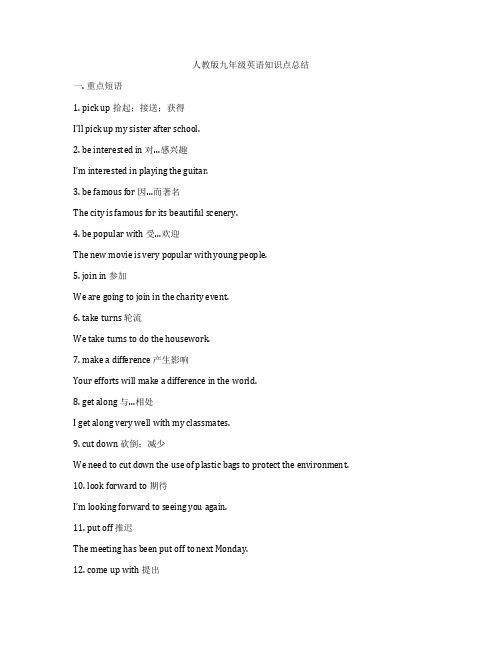
人教版九年级英语知识点总结一. 重点短语1. pick up 拾起;接送;获得I’ll pick up my sister after school.2. be interested in 对…感兴趣I’m interested in playing the guitar.3. be famous for 因…而著名The city is famous for its beautiful scenery.4. be popular with 受…欢迎The new movie is very popular with young people.5. join in 参加We are going to join in the charity event.6. take turns 轮流We take turns to do the housework.7. make a difference 产生影响Your efforts will make a difference in the world.8. get along 与…相处I get along very well with my classmates.9. cut down 砍倒;减少We need to cut down the use of plastic bags to protect the environment.10. look forward to 期待I’m looking forward to seeing you again.11. put off 推迟The meeting has been put off to next Monday.12. come up with 提出We need to come up with a plan for the project. 13. keep in touch 保持联系We keep in touch by sending emails.14. make up 编造;弥补She made up a story about why she was late.15. run out of 用完We have run out of milk and need to buy some more.二. 重点语法1. 一般现在时肯定句:主语 + V原 + 其他He plays football every weekend.否定句:主语 + do not/does not + V原 + 其他I do not like watching horror movies.疑问句:Do/Does + 主语 + V原 + 其他Do they enjoy playing basketball?2. 一般过去时肯定句:主语 + V-ed/Vt + 其他She visited Beijing last year.否定句:主语 + did not + V原 + 其他We did not go to the concert last night.疑问句:Did + 主语 + V原 + 其他Did you finish your homework yesterday?3. 现在进行时肯定句:主语 + am/is/are + V-ing + 其他She is watching TV now.否定句:主语 + am/is/are + not + V-ing + 其他He is not playing football at the moment.疑问句:Am/Is/Are + 主语 + V-ing + 其他Are you studying for the exam?4. 一般将来时肯定句:主语 + will + V原 + 其他She will travel to Japan next month.否定句:主语 + will not + V原 + 其他I will not forget to call you.疑问句:Will + 主语 + V原 + 其他Will he come to the party?5. 现在完成时肯定句:主语 + have/has + V过去分词 + 其他They have finished their homework.否定句:主语 + have/has + not + V过去分词 + 其他We have not seen this movie yet.疑问句:Have/Has + 主语 + V过去分词 + 其他Have you ever been to Paris?6. 被动语态肯定句:主语 + am/is/are + V过去分词 + 其他The book is written by my favorite author.否定句:主语 + am/is/are + not + V过去分词 + 其他The dishes are not washed by my brother.疑问句:Am/Is/Are + 主语 + V过去分词 + 其他Is the car fixed by the mechanic?三. 重点词汇1. 人物teacher 老师student 学生doctor 医生nurse 护士engineer 工程师pilot 飞行员musician 音乐家actor 演员writer 作家scientist 科学家athlete 运动员2. 动作run 跑步jump 跳跃swim 游泳dance 跳舞sing 唱歌play 演奏climb 爬山cook 烹饪paint 绘画ride 骑行3. 环境house 房子school 学校hospital 医院office 办公室library 图书馆park 公园beach 海滩mountain 山river 河lake 湖四. 重点句型1. 八大情态动词can 能够I can speak English fluently.could 过去能够She could play the piano when she was five. may 可能May I go to the restroom, please?might 可能It might rain this afternoon.must 必须You must finish your homework before 8pm. shall 将要Shall we go to the movies tonight?should 应该You should study for the exam tomorrow.will 将要We will visit the Great Wall next week.2. 祈使句Be quiet! 安静!Don’t be late! 别迟到!Sit down, please. 请坐下。
人教版初三英语知识点
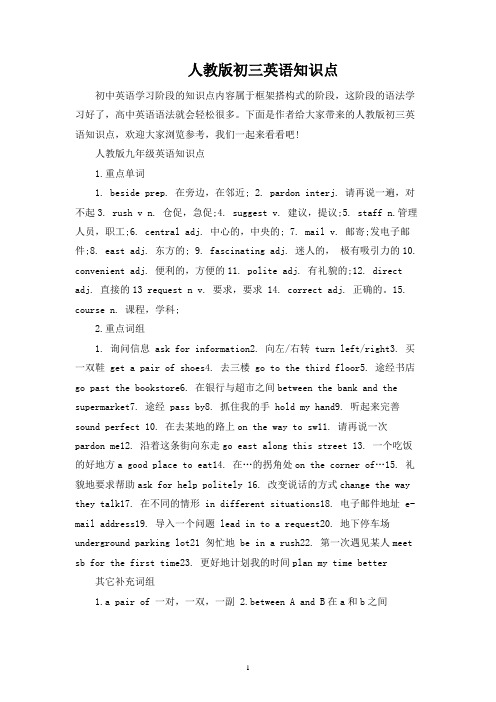
人教版初三英语知识点初中英语学习阶段的知识点内容属于框架搭构式的阶段,这阶段的语法学习好了,高中英语语法就会轻松很多。
下面是作者给大家带来的人教版初三英语知识点,欢迎大家浏览参考,我们一起来看看吧!人教版九年级英语知识点1.重点单词1. beside prep. 在旁边,在邻近;2. pardon interj. 请再说一遍,对不起3. rush v n. 仓促,急促;4. suggest v. 建议,提议;5. staff n.管理人员,职工;6. central adj. 中心的,中央的;7. mail v. 邮寄;发电子邮件;8. east adj. 东方的;9. fascinating adj. 迷人的,极有吸引力的10. convenient adj. 便利的,方便的11. polite adj. 有礼貌的;12. direct adj. 直接的13 request n v. 要求,要求 14. correct adj. 正确的。
15. course n. 课程,学科;2.重点词组1. 询问信息 ask for information2. 向左/右转 turn left/right3. 买一双鞋 get a pair of shoes4. 去三楼 go to the third floor5. 途经书店go past the bookstore6. 在银行与超市之间between the bank and the supermarket7. 途经 pass by8. 抓住我的手 hold my hand9. 听起来完善sound perfect 10. 在去某地的路上on the way to sw11. 请再说一次pardon me12. 沿着这条街向东走go east along this street 13. 一个吃饭的好地方a good place to eat14. 在…的拐角处on the corner of…15. 礼貌地要求帮助ask for help politely 16. 改变说话的方式change the way they talk17. 在不同的情形 in different situations18. 电子邮件地址 e-mail address19. 导入一个问题 lead in to a request20. 地下停车场underground parking lot21 匆忙地 be in a rush22. 第一次遇见某人meet sb for the first time23. 更好地计划我的时间plan my time better 其它补充词组1.a pair of 一对,一双,一副2.between A and B在a和b之间3.on one’s / the way to 在去……的路上4.pardon me 什么,请再说一遍5.pass by 途经经过6.look forward to 盼望期待7.excuse me 打扰了请谅解 8.get some magazines 得到一些杂志9.get some information about 获取有关……的一些信息10.turnleft\right 向左\向右转11.go past 经过途经 12.a little earlier 早一点儿13.a good place to eat 一个吃饭的好地方 14.in different situation 在不同的情形下15.on time 准时按时 16.get to 到达17.have dinner 吃晚餐18.on one’s / \the right在右边19Xe on 快点请过来 20.the shopping center 购物中心21.the corner of....... 的角落/拐角处 22.lead into 导入引入3.重点句式1. ---请问,你能告知我怎样才能到书店吗?---当然,只需沿主街走只到你途经中心街。
初中英语知识点总结归纳(完整版)人教版

初中英语知识点总结归纳(完整版)人教版初中英语知识点总结归纳(完整版)人教版每一阶段的学习都有要求我们掌握的基础知识,那么关于初中英语的知识点都有哪些呢以下是小编准备的一些初中英语知识点总结归纳(完整版),仅供参考。
简单句的五种基本句型1.“主语+谓语”(即“主谓”句型)例:They arrived in Harbin yesterday morning.分析:“they”(主语)“arrived”(谓语)。
2.“主语+谓语+宾语”(即“主谓宾”句型)例:I study English.分析:“I”(主语)“study”(谓语动作)“English”(宾语即动作涉及的对象)。
3.“主语+谓语+间接宾语+直接宾语”(即“主谓双宾”句型)例:Our teacher taught us English.分析:“our teacher”(主语)“教”(谓语动作)“us”(间接宾语)“English”(直接宾语)。
4.“主语+谓语+宾语+宾语补足语”(即“主谓宾宾补”句型)例:He asked her to go there.分析:“he”(主语)“asked”(谓语动作)“her”(宾语即动作涉及的对象)“to go there”(补语—补充说明宾语做什么)。
5.“主语+系动词+表语”(即“主系表”句型)常用的系动词有be, keep,lie, remain, stand, become, fall, get, go, grow, turn, look, feel, seem, smell, sound, taste,等。
例:I am a teacher.分析:“I”(主语)“am”(系动词)“a teacher”(表语—即表明主语的身份)。
初中英语八种基本时态1. 一般现在时概念: 表示经常发生的动作或经常存在的状态。
常和 always , often , usually , sometimes , every day 等表时间的状语连用。
人教版中考英语语法复习讲义宾语从句
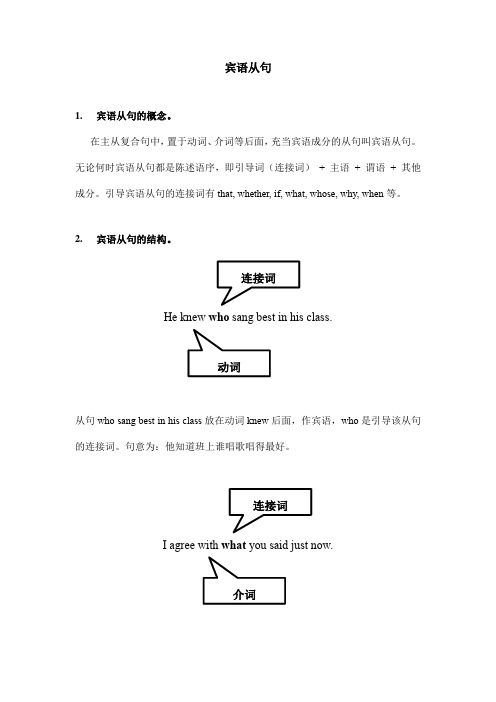
宾语从句1.宾语从句的概念。
在主从复合句中,置于动词、介词等后面,充当宾语成分的从句叫宾语从句。
无论何时宾语从句都是陈述语序,即引导词(连接词)+ 主语+ 谓语+ 其他成分。
引导宾语从句的连接词有that, whether, if, what, whose, why, when等。
2.宾语从句的结构。
连接词He knew who sang best in his class.动词从句who sang best in his class放在动词knew后面,作宾语,who是引导该从句的连接词。
句意为:他知道班上谁唱歌唱得最好。
连接词I agree with what you said just now.介词从句what you said just now放在介词with的后面,作宾语,what是连接词。
句意为:我同意你刚才说的话。
3.引导宾语从句的连接词。
1)that引导的宾语从句。
that引导的宾语从句没有词意,只起连接作用,用来引导意思完整的陈述句,可以省略。
that引导的宾语从句表示肯定的概念,如希望,相信,知道或说。
例句如下:1.I hear that he will be back in an hour. 我听说他会在一个小时后回来。
2.I hope that it will snow this winter. 我希望今年冬天会下雪。
3.I believe that we shall bee good friends. 我相信我们会成为好朋友。
2)whether/if引导的宾语从句。
whether/if引导的宾语从句词意为是否,在宾语从句中不作成分,不可省略。
通常可以互换,但是介词后面只能用whether,宾语从句中含有or not的只能用whether来引导,即whether和or not在宾语从句中为固定搭配,其他不含or not 的宾语从句可以用whether或if来引导。
例句如下:1.He does not know whether they will plant trees on Saturday or not. 他不知道他们周六是否会去植树。
(完整版)人教版初中英语知识点汇总
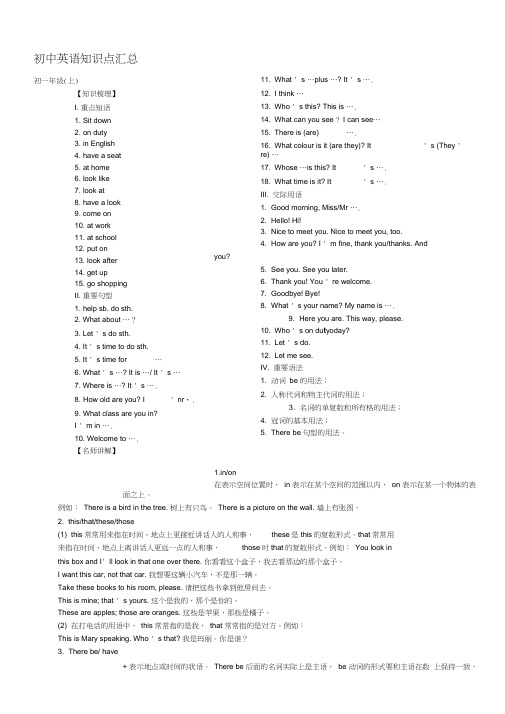
11. What ' s …plus …? It ' s …. 12. I think …13. Who ' s this? This is …. 14. What can you see ? I can see … 15. There is (are)….16. What colour is it (are they)? It ' s (They 're) …17. Whose …is this? It ' s …. 18. What time is it? It ' s ….III. 交际用语1. Good morning, Miss/Mr ….2. Hello! Hi!3. Nice to meet you. Nice to meet you, too.4. How are you? I ' m fine, thank you/thanks. And you?5. See you. See you later.6. Thank you! You ' re welcome.7. Goodbye! Bye!8. What ' s your name? My name is ….9. Here you are. This way, please.10. Who ' s on du t yoday? 11. Let ' s do. 12. Let me see. IV. 重要语法 1. 动词 be 的用法;2. 人称代词和物主代词的用法;3. 名词的单复数和所有格的用法;4. 冠词的基本用法;5. There be 句型的用法。
1.in/on在表示空间位置时, in 表示在某个空间的范围以内, on 表示在某一个物体的表面之上。
例如: There is a bird in the tree. 树上有只鸟。
人教版初中英语中考80个重要考点
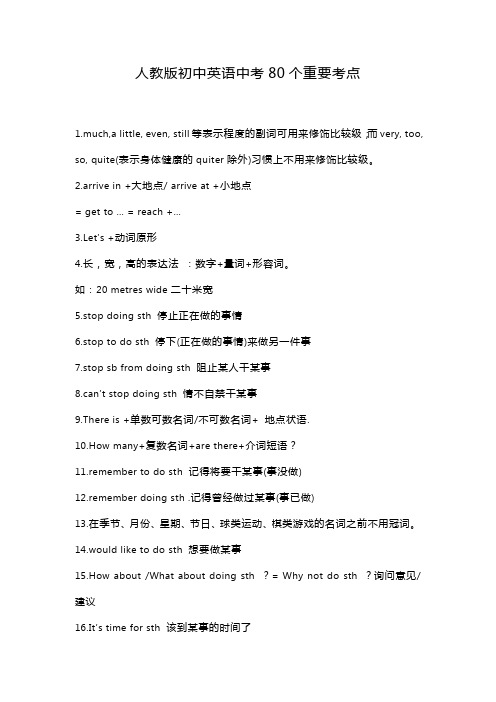
人教版初中英语中考80个重要考点1.much,a little, even, still等表示程度的副词可用来修饰比较级;而very, too, so, quite(表示身体健康的quiter除外)习惯上不用来修饰比较级。
2.arrive in +大地点/ arrive at +小地点= get to … = reach +…3.Let’s +动词原形4.长,宽,高的表达法:数字+量词+形容词。
如:20 metres wide二十米宽5.stop doing sth 停止正在做的事情6.stop to do sth 停下(正在做的事情)来做另一件事7.stop sb from doing sth 阻止某人干某事8.can’t stop doing sth 情不自禁干某事9.There is +单数可数名词/不可数名词+ 地点状语.10.How many+复数名词+are there+介词短语?11.remember to do sth 记得将要干某事(事没做)12.remember doing sth .记得曾经做过某事(事已做)13.在季节、月份、星期、节日、球类运动、棋类游戏的名词之前不用冠词。
14.would like to do sth 想要做某事15.How about /What about doing sth ?= Why not do sth ?询问意见/建议16.It’s time for sth 该到某事的时间了17.It’s time to do sth该到干某事的时间了18.have fun doing sth 很高兴干某事19.make sb do sth 使某人干某事20.can’t afford to do sth 没有足够多钱干某事21.can’t stand doing sth 不能忍受干某事22.mind doing sth 介意干某事23.try to do sth 尽力干某事24.finish doing sth 结束干某事25.decide to do sth 决定干某事26.plan to do sth 计划干某事27.It +takes +sb.+时间+to do sth28.sb. +spend +时间+on sth (in doing sth )29.Can you do sth ?你可以做,,,吗30.be busy doing sth 忙于干某事31.called = named = with the name (of)32.at the age of = when sb was/ were ….33.because of 后面接名词、代词、名词性短语、what从句34.keep doing sth . 表示不间断地持续做某事或一直做某事。
人教版中考英语中考英语总复习过去进行时知识点总结

人教版中考英语中考英语总复习过去进行时知识点总结一、初中英语过去进行时1.It when I my homework last night. ()A. raining, didB. rained, was doingC. was raining, doD. rains, was doing【答案】 B【解析】【分析】句意:昨晚当我正在做作业时,下雨了。
结合语境可知主句描述的是过去发生的动作,故用一般过去时态。
从句中描述的是过去某时正在进行的动作,故用过去进行时态。
选B。
【点评】英语中的时态主要是借助于时间状语与上下文语境来进行判断。
解答此类题型,首先要注意句子中的时间状语,如果没有则要通过分析上下文,结合语境来判断句子的时态。
英语疑问句中一般具有时态上的对应关系,注意结合这一特点进行区分。
2.Tom said he ____basketball with his classmates from 4:00 to 6:00 yesterday afternoon.A. is playedB. was playingC. playsD. had played【答案】 B【解析】【分析】句意:汤姆说他昨天下午4点到6点正在和同学一起打篮球。
A.被打;B.正在打;C.打,三单式;D.打,过去完成时。
根据from 4:00 to 6:00 yesterday afternoon可知用过去进行时,其构成为was/ were doing,主语是he,第三人称单数,be动词用was,故答案选B。
【点评】考查动词的时态。
注意过去进行时的用法。
3.—What were you doing at this time yesterday?—I ________on the grass and drawing a picture.A. sitB. satC. am sittingD. was sitting【答案】 D【解析】【分析】句意:—昨天这个时候你在做什么?—我正坐在草地上画画。
2024年中考复习中考初中英语必考知识点总结归纳

2024年中考复习中考初中英语必考知识点总结归纳
2024年中考复习中考初中英语必考知识点总结归纳
2024年中考复习中考初中英语必考知识点总结归纳
2024年中考复习中考初中英语必考知识点总结归纳
2024年中考复习中考初中英语必考知识点总结归纳
2024年中考复习中考中英语必考知识点总结归纳
2024年中考复习中考初中英语必考知识点总结归纳
2024年中考复习中考初中英语必考知识点总结归纳
2024年中考复习中考初中英语必考知识点总结归纳
2024年中考复习中考初中英语必考知识点总结归纳
2024年中考复习中考初中英语必考知识点总结归纳
2024年中考复习中考初中英语必考知识点总结归纳
2024年中考复习中考初中英语必考知识点总结归纳
2024年中考复习中考初中英语必考知识点总结归纳
2024年中考复习中考初中英语必考知识点总结归纳
2024年中考复习中考初中英语必考知识点总结归纳
2024年中考复习中考初中英语必考知识点总结归纳
2024年中考复习中考初中英语必考知识点总结归纳
2024年中考复习中考初中英语必考知识点总结归纳
2024年中考复习中考初中英语必考知识点总结归纳
2024年中考复习中考初中英语必考知识点总结归纳
2024年中考复习中考初中英语必考知识点总结归纳
2024年中考复习中考初中英语必考知识点总结归纳
2024年中考复习中考初中英语必考知识点总结归纳
2024年中考复习中考初中英语必考知识点总结归纳
2023年人教版初中英语中考专题复习数词

sixteen→sixteenth seventeen→seventeenth eighteen→eighteenth
nineteen→nineteenth twenty→twentieth
thirty→thirtieth
forty→fortieth
fifty→fiftieth
sixty→sixtieth
A.the second B.a second
C.two
7.—When was the Communist Party of China founded?
—In 1921.It’s her _B_____ birthday this year.
A.hundred B.hundredth C.hundreds of D.the hundredth
C.twenty
5.—Our school is going to hold the __B____ Culture Festival.
—I see.And we can take part in the activity again.
A.five B.fifth
C.fifths
6.My aunt has only one child,and she wants __B____ child.
【答题方法】 解答此类的问题,考生应该做到:①根据句意及数词的含义来确定用基
数词还是序数词,基数词一般表示“几(个)”,序数词表示“第几”;②根 据基数词与序数词之间的变化规律来选择正确的形式。
如何判断用基数词还是序数词 1.填基数词 (1)表示几年、几岁、几点钟等时间用基数词。 (2)表示电话号码或某物的数量时,用基数词。 (3)in the+年份的复数(为基数词复数)。如:in the 1980s; (4)固定用法。如:at the age of+基数词;page+基数词等。
(完整版)人教版初中英语中考复习知识点归纳总结全册

人教版英语中考分册复习知识点Unit 1-Unit 2重点句型1. —My name’s Jenny. —I’m Gina. Nice to meet you.2. —What’s your/his/her name? —My/His/Her name is … .3. What’s your/his/her family/first name?4. —What’s your telephone number? —It’s 218-9176.5. What’s his/ her telephone number?6. —What’s this/that in English? —It’s a ruler.7. —Is this/that your pencil? —Yes, it is./No, it isn’t.8. How do you spell pencil?/Spell pencil./Can you spell pencil?9. Is that your computer game in the lost and found case?10. Call Alan at 495-3539.重点语法be在一般现在时中的基本用法:I用am, you用are,is跟着他她它。
He ,she ,it用is,we, you they都用are。
单数名词用is,复数名词都用are。
be的几种形式:is, am, are —being —was, were —been主谓一致:主谓一致的15种常考情况:1.表示时间,重量,数目,价格,长度,数学运算等的词或短语作主语时,尽管他们是复数形式,但如果把这些复数形式的词或短语看作是一个整体,谓语动词用单数形式。
Two months is quite a long time. Twenty dollars is enough.2.动词不定式,动名词,从句或不可数名词作主语时,谓语动词用单数。
人教版初中英语九年级全册-中考英语一轮复习语法知识点

初三全册语法知识点
Grade 9
Unit 1 How can we become good learners?
Verb +bywith gerund动词+by doing sth.动名词,通过…
◉短语动词
不及物动词+副词(其后不加宾语)
breakout爆发come up(计划、建议被)提出fall behind落后
3.一般将来时的被动语态:由“shall/will/be going to/be to be+过去分词”构成。shall用于第一人称,will用于各种人称
6.某些习惯用法中(有些习惯用法常以被动形式出现,强调存在的状态)
被动语态的习惯搭配
be determined to do决心做
be interested in对……感兴趣
be seated...坐好
be dressed in...穿着……
三、被动语态的常用句式
1.普通句式
(1)肯定句式:主语+be+过去分词+其他。
8.过去完成时的被动语态:由“had been+过去分词”构成
二.被动语态的用法
下列情况下通常使用被动语态。
1.不知道动作的执行者或虽然知道动作的执行者但没有必要说出时
2.当强调动作承受者时,常用by引出动作的发出者
3.当动作的执行者是无生命名词时
4.当动作的执行者是泛指或很模糊时
5.出于礼貌不便提及动作执行者时
be+过去分词”既可表示动作,也可表示状态,但“get+过去分词”只能表示动作。
Unit 6 When was it invented?
Passive voice (past tense)被动语态一般过去时
人教版初中英语七年级下册中考总复习:Units4-6七年级下册教材考点梳理整合+单元练习(含答案)
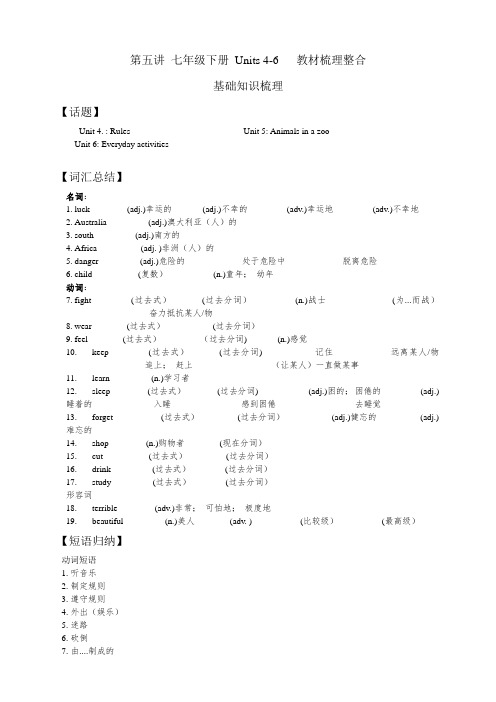
第五讲七年级下册Units 4-6 教材梳理整合基础知识梳理【话题】Unit 4. : Rules Unit 5: Animals in a zooUnit 6: Everyday activities【词汇总结】名词:1.luck ________(adj.)幸运的_______(adj.)不幸的_________(adv.)幸运地_________(adv.)不幸地2.Australia _________(adj.)澳大利亚(人)的3.south _________(adj.)南方的4.Africa _________ (adj. )非洲(人)的5.danger _________(adj.)危险的____________ 处于危险中_____________脱离危险6.child __________(复数)__________ (n.)童年;幼年动词:7.fight________ (过去式)_______(过去分词)__________(n.)战士_______________(为...而战)_________________ 奋力抵抗某人/物8.wear________(过去式)___________(过去分词)9.feel________(过去式)_________(过去分词)_______(n.)感觉10.keep ________(过去式)_______(过去分词)____________记住_____________远离某人/物_________________ 追上;赶上__________________(让某人)一直做某事11.learn _________(n.)学习者12.sleep ________(过去式)________(过去分词)___________ (adj.)困的;困倦的_________(adj.)睡着的______________入睡________________感到困倦__________________去睡觉13.forget __________ (过去式)_________(过去分词)___________(adj.)健忘的__________(adj.)难忘的14.shop ________(n.)购物者________(现在分词)15.cut __________(过去式)_________(过去分词)16.drink _________(过去式)________(过去分词)17.study _________(过去式)________(过去分词)形容词18.terrible ________(adv.)非常;可怕地;极度地19.beautiful _________(n.)美人________(adv. )___________(比较级)__________(最高级)【短语归纳】动词短语1.听音乐__________________2.制定规则__________________3.遵守规则___________________4.外出(娱乐)__________________5.迷路_________________________6.砍倒________________________7.由....制成的____________________8.看报纸____________________9.去电影院____________________10.出去吃饭____________________11.喝茶_______________________12.做汤______________________介词短语13.按时_______________________14.放学后____________________15.及时_____________________16.在食堂____________________17.处于(极大)危险之中______________________形容词短语18.(对某人)要求严格_____________19.害怕....______________________名词短语20.赛龙舟__________________21.端午节_____________________22.南非____________________【句子提炼】规则意识1.我们上课不能迟到。
初中英语中考复习 【中考英语】人教版九年级全册 Units 13-14 复习课件
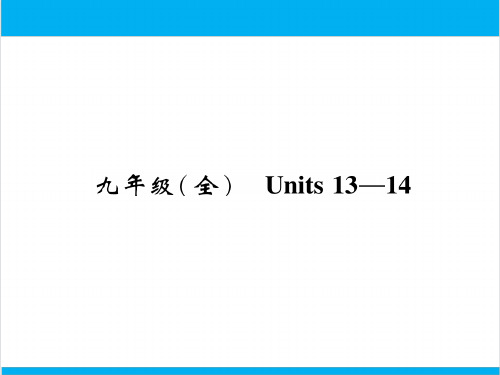
单元重点回顾
单元重难点突破
高频话题写作指导 直击中考
6.__Not__only__ can the art bring happiness to others, __but__ it __also__ shows that even cold,hard iron can be brought back to life with a little creativity.艺术不但 可以给他人带来快乐,而且也说明只需要一点创造力,即便是冰冷、 坚硬的铁也可以产生活力。 7.I am trying to __keep__my__cool__.我在尽力保持冷静。 8.As you __set__out__ on your new journey,you shouldn't forget where you came from.在新的旅行启程之际,不应忘了你 来自何处。
单元重点回顾
单元重难点突破
高频话题写作指导 直击中考
单元重点回顾
单元重难点突破
Байду номын сангаас
高频话题写作指导 直击中考
单元重点回顾
单元重难点突破
高频话题写作指导 直击中考
单元重点回顾
单元重难点突破
高频话题写作指导 直击中考
单元重点回顾
单元重难点突破
高频话题写作指导 直击中考
单元重点回顾
单元重难点突破
高频话题写作指导 直击中考
单元重点回顾
单元重难点突破
高频话题写作指导 直击中考
12.work(n.)(音乐、艺术)作品 13.metal(n.)金属 14.survey(n.)调查 15.standard(n.)标准;水平★ 16.row(n.)一排;一列;一行 17.keyboard(n.)键盘式电子乐器;键盘 18.method(n.)方法;措施★ 19.instruction(n.)指示;命令★ 20.text(n.)课文;文本 21.level(n.)水平 22.degree(n.)(大学)学位;度数;程度 23.manager(n.)经理;经营者 24.gentleman(n.)先生;绅士 25.task(n.)任务;工作 26.wing(n.)翅膀;翼
- 1、下载文档前请自行甄别文档内容的完整性,平台不提供额外的编辑、内容补充、找答案等附加服务。
- 2、"仅部分预览"的文档,不可在线预览部分如存在完整性等问题,可反馈申请退款(可完整预览的文档不适用该条件!)。
- 3、如文档侵犯您的权益,请联系客服反馈,我们会尽快为您处理(人工客服工作时间:9:00-18:30)。
人教版初中英语中考总复习知识点系列*初一上U1-8 词组和句型2007年03月21日星期三下午 8:29初一上U1-8 词组和句型U11. Good morning-Good morningGood afternoon-Good afternoonGood evening-Good evening2. Hello-Hello Hi-Hi3. Nice to meet you. – Nice to meet you, too.4. How do you do? – How do you do?5. I’m Han Mei / My name is Han Mei.6. Sit down, please.7. How are you? I’m fine/Ok/all right/very well.8. What is /What’s this? It’s / It is an apple9. What is / What’s your name? My name is / My name’s Ann.U21. Sorry. - That’s all right. / That’s OK.2. This is Jim Green.3. Can you spell it, please?-- Yes, J-I-M, Jim, G-R-double E-N, Green.4. Excuse me . Are you Mr. Read?--Yes, I am. / No, I’m not.5. Welcome to China!6. Where’s / Where is “B”? It’s here.7. Goodbye! Bye! Bye-bye! See you. See you later.U31. What’s your (his, her,) number?--My/ His/ Her number is 5 (five).--I’m/ He’s /She’s number 5(Five).2. He is in Row 1 (One)/ What row is he in?in Class 2 (Two) / What class is he in?in Grade 3 (Three) / What grade is he in?in Class 2, Grade 3. / What class is he in?number 2. / What’s his number? / What number is he?3. He is Number 2 in Row 1. He is number 2, Row 1.4. What’s one plus one? It’s two.5. What’s one minus one ? It’s zero.6. How old are you? I’m eleven.U41. What’s this / that in English? It’s a pen /an eraser.2. an apple/ orange/ egg/eraser/English boy/old man/ American girl an “Aa”/Ee/Ii/Oo/Ff/Hh/Ll/Mm/Nn/Rr/Ss/Xx3. Is this/ that a map? Yes, it is. No, it isn’tU51. Who is this? This is/ She is Toy.2. I think he’s very old.3. Who’s that in Picture 1 (one)? Who’s that in the picture?4. I don’t know his /her/its/your name.5. Is he /she /it ten? Yes, he/she/it is. No, he/she/it isn’t.6. Who’s not here? Ann is not here.7. at school/ at home8. This is Sam. / Is that Sam?9. Is Bill in? Is Bill at home?10. Is your friend a boy or a girl? She is a girl.U61. Here you are.2. That’s OK/That’s all right/You’re welcome/Not at all.3. What are/What’re these /those? They are /they’re boxes.4. It’s very good/nice.5. banana trees6. Are these/those your English books? Yes, they are/No, they aren’t.7. Thank you /thanks very much /a lot.8. come in.U71. Who’s on duty today?2. Are we all here? / Is everyone here?3. We have two new students.4. Their names are…5. We’re twins.6. You look the same7. We’re American(s)/Japanese/Chinese/English.I’m (an) American/(a) Japanese/(a) Chinese/EnglishHe’s an American boy/an English boy/a Japanese boy/a Chinese boy.8. look after the twins.9. This way, please.10. Am I in the same row?11. Can we put our coats here /there/over there?12. Put them here.13. Am I in Row one?Are we in Row One? Yes, you are. /No, you aren’tAre you there? Yes, we are. /No, we aren’tYes, I a m. /No, I’m not.14. Are they new? Yes, they are. /No, they aren’t.U81. fax/phone/bike/room/ID number2. Ask that man over there.3. Your car licence number4. look at this, please.5. Can I see your licence?6. I’ll take it.7. What’s his address?8. My teacher’s name is Gao Hui.9. I have two good friends.10. My home phone number is…初一上U9-U16单元重点句型和词组U91.family tree2.in England/China/America3. Jim and I are good friends.You, he and I are good friends.4. We go to the same school in Beijing.We go to different schools in Beijing.6. go and see, please7. come in/come here/come to school/come home/come down8. have a seat =sit down9. You look like Lucy’s hat.You and Lucy’s hat look the same.11. She is like her dad.She looks like her dad.She and her dad look the same.She likes her dad .I want a sweater like this.12. your family photo = a photo of your family.A picture of Ann’s family = Ann’s family photo/picture.A picture of the Green family= the Greens13.The Green family are at home.The Greens are at homeThe Green family is a big family.15. Glad to meet you.Nice/Glad to see you.16. I teach her Chinese and she teaches me English .17. have a cup of tea with meU106. on the tree(本)/in the tree(外)on the wall/in the wall(window, door, hole)8. a picture of a classroom.9. look at the picture11. There is a map on the wall in the classroom.12. It’s a map of China. It’s a map of the world.14. It’s an SAR15. Here it is. Here you are.16.on the fish bowl.U11.1. What’s in the teacher’s room?There is a desk in it.There are two boxes and a desk in it.2. at the door of the teacher’s room.3. The door is locked.4. Can you see her?Can you see her desk?5. There are many things.There are some books.6. We must open the door and get the ball.7. on a piece of paper.8. Can you help me?Can I help you?10. There’s some money in my purse.11. Don’t worry. Let me help you find it.12. Let’s (us) help them find her and him.14. Let me see. Let me have a look.Let me see the picture.Let me have a look at the picture.Let me look at the picture.18. like to play in the tree house. Like playing in the tree house19. He’s up there in the tree with Bill (me)He and Bill (I) are up there in the tree.He with Bill (me) is up there in the tree.21. That’s it.U121.a Young Pioneer2.How many children/men/women are there?There is only one/there are some(two)/There aren’t any3.They’re at school/at home/at work.5. let me count.6. There is a boat on the river/in the river7. Is there a light on the desk?Yes, there is. No there isn’t.8. There are some animals in the picture.Are there any animals in the picture?Yes, there are. No, there aren’t (any)There aren’t any animals in the picture.9. (one) two sheep /fish/Japanese/Chinese/ two people.10. There is a little sheep there13. Come on.14. go and ask Peter/him.15. There isn’t a cat. /There is no cat.There aren’t any cats. / There are no cats.16.I can see a bike under the tree.I can see two bikes under the tree.1)How many bikes can you see under the tree?2)What can you see under the tree?17. There is a hill in the picture.There are two hills in the picture.1)How many hills are there in the picture?2)What’s in the picture?18. 1)I have a brother.2)We have some brothers.3)It is a book.4)They are books.19.There is a sheep over there.There are some sheep over there.20. Is there a sheep over there?Are there any sheep over there?22. There are two boys in the boat.U131. It’s a black car. What is it?2. The car is black. What colour is the car3. The black car is new. Which car is new?4. It’s black / red /pink /white /green /yellow /blue /purple /brown /orange /grey/dark blue/light blue5.Can’t you see?6. One is red and one is grey.One is red and the other is grey.7. I like that one.8. You have a very nice sweater.9. It looks very nice/very new /very old.He looks very young/very old.10. The one in the green car.12. The woman in the red coat. /in red/in the red hat/ in the black gloves/ in the brown shoes.13. The girl is under the tree.Where is the girl?The girl under the tree is my sister.Which girl is your sister?15. The small/old/big /new one in Tom’s. Which one is Tom’s?16. in Picture 1 /in the picture.17. colour it /them green18.There are five people in my family.19. We live in a house /We live in Fuzhou.20. There is a small garden.U141. look at the clothes.2. on Mrs Green’s clothes line.3. Whose clothes do you think they are?Whose clothes are they?4. What colour is Mrs Green’s dress?It’s light purple.5. What colour are Kate’s shoes /gloves/trousers/clothes/socksThey’re dark brown9. Is this red coat yours?Is this your red coat?11.These/Those trousers are theirs.These /Those are their trousers.12. Put it /them ontake it /them offput your shoes ontake your shoes offput on your shoestake off your shoes13. 1)my gloves are green. What about yours?2)What about the brown one?3)What about going to school?4)He is a doctor. What about her?15. take them to the classroom16. beside/ near /at the tree.18. Who in our class has brown shoes?19.Whose shirt in Row 2 is white?20.In the Read family. /in the Reads23. I’m from /I come from Fuzhou.24. in the middle of China.25. about nine hundred students.26. in our school.in our class.In our classroom.27.Our names are almost the same.28.She is nice to me.29.I want to find a pen-friend.30. Write to me31.1)This blouse is mine.Whose is this blouse?2)This is my blouse.Whose blouse is this?U151.give sb sth/ give sth to sb(宾)1) give me the book /give the book to me.2) Give it /them to me2.Can you look after my watch?(请求)I can see the bird in the tree(能力)You can go with Dad to day. (许可)3.What’s the time?What time is it?8.4:30:four thirty half past four.9.4:15: four fifteen a quarter past four10.12:00 twelve o’clock/noon11.3:25 three twenty five twenty-five past three.12.3:55 three fifty-five five to four13.9:05 nine o five five past nine14.It’s time(to have a )(for) break15.It’s time (to have a )(for) class.16.It’s time (to have)(for) breakfast/lunch/supper.17.It’s time (to play)(for) games/football/basketball/Ping Pong18.It’s time (to go to)(for) bed/school.19. get upIt’s time to clean the classroomI must watch TVLet’s go home /go there23.in the morning/afternoon/evening28.at night33.I like my work very much.34.One and one is two->What’s one and one?He is ten -> How old is he?I’m Number 2 ->What number are you?He’s in class10 -> What class is he in?I can see 5 people in the soot -> How many people can you see?It’s ten to five. -> What’s the time?What time is it?35. There are sixty minutes in an hour.U131. find the differences.2. What difference can you find?3. in different classes.4. What/Who else can you see?5. go shopping6. Can I see it?Can I have a look at it?7. They look young.8. Who’s that man between him and h er?9. What’s your email address?10. Draw some birds over the hill.11. He has many toys for the children.12. He gives different toys to different children.13. The girls play with dolls and toy animals.14. He is a father of four children.15. We look like each other(彼此)16. I catch mice.17. we can be friends.18. Let’s be good friends.19. Nice meeting you.Nice to meet you.初三复习教案样本2007年03月21日星期三下午 10:40第八课时复习内容七年级下units 11-12unit 11 What do you think of game shows?目标语言:give opinions;talk about likes and dislikes重点句型:What do you think of sitcoms? I love them.What does she think of sports shows? She doesn’t mind them.How about..?=What about..?Thanks for joining us.I can’t stan d it.重点词组:think of, talk about, soap opera, sports show, situation comedy, game show, how about, weekend talk, a thirteen-year-old boy, hair clip, key ring, enjoy doing, thanks for doing, mind doing, show sb. sth, show sth to sb. , show sb around知识点:1. Mind的用法1)mind作“介意”“反对”讲,为及物动词或不及物动词,常用与疑问句,否定句,条件句中,其后可跟名词,代词,动名词或从句。
